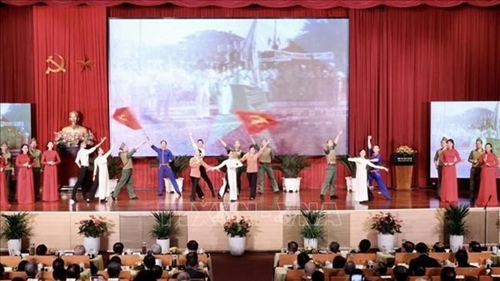Addressing the event, Deputy Prime Minister Tran Luu Quang affirmed that with the agreement, for the first time in the history, basic national rights of Vietnam, which are independence, sovereignty, unity and territorial integrity, were officially affirmed in an international treaty, and recognized and respected by the countries and parties attending the Generva peace conference.
    |
 |
|
An art performance at the ceremony |
The agreement demonstrates the stature, mettle and characteristics of the Vietnamese diplomacy in the Ho Chi Minh era, spreading the message of a peace-loving Vietnamese nation with respect for justice and righteousness, strong will to protect independence, sovereignty and territorial integrity, and willingness for friendly cooperation with all countries and peoples in the world, he said.
With the Geneva Agreement, Vietnam inspired and encouraged the movement for national liberation across five continents for independence, freedom, peace, democracy, progress and social justice, leading to the collapse of old colonialism around the world, the Deputy PM stressed.
PM Quang highlighted that the victory at the Geneva peace conference was resulted from the Party's correct revolutionary path under the sound leadership and direction of President Ho Chi Minh, the resilient, indomitable and persistent fighting spirit of the army and people during nine years of resistance that culminated in the historic Dien Bien Phu Victory, and the support and solidarity of international friends and peace-loving people across the globe.
He held that after 70 years, the agreement still left many valuable lessons for national building and safeguarding today and in the future.
Minister of Foreign Affairs Bui Thanh Son affirmed that the success that Vietnam gained at the Geneva peace conference, the first major multilateral international conference that Vietnam attended to negotiate and sign international treaties with the direct participation of major powers, came from the desire for peace, heroic patriotism, and the brainpower and mettle of Vietnamese people.
The minister held that along with the Preliminary Agreement in 1946 and the Paris Agreement in 1973, the Geneva Agreement in 1954 was a glorious milestone in Vietnam’s revolutionary diplomacy imbued with the Ho Chi Minh diplomatic ideology, style and art.
Many valuable lessons from the Geneva Agreement need to continue to be researched, evaluated and summarized to apply in the building of a school of foreign affairs and diplomacy imbued with the identity of "Vietnamese bamboo," he stated.
At the event, Major General Pham Son Duong, the son of late Prime Minister Pham Van Dong who led the negotiating team of the Government of the Democratic Republic of Vietnam, shared memorable stories that he had heard from his father.
In their speeches, Lao and Cambodian ambassadors to Vietnam underlined the internal and international solidarity among leaders of the Indochinese Communist Party and the Communist Parties of the three countries reflected through the agreement.
After 70 years, the Geneva Accords on ending the war and restoring peace in Indochina have maintained their values in the cause of peace building as well as national construction, defense and development in the three Indochinese countries in the current situation, stated Lao Ambassador Khamphao Ernthavanh.
Cambodian Ambassador Chea Kimtha described the ceremony as a chance for today generation to honor heroes of the Vietnamese liberation army who fought to regain independence from the colonial rule.
Source: VNA